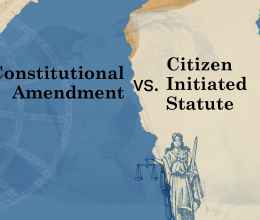Below is our Chief Lobbyist Gary Daniels’ interested party testimony on House Bill 101. This was delivered to the House Infrastructure and Rural Development Committee on April 27, 2021.
To Chairman Stoltzfus, Vice Chair Dean, Ranking Member Brown, and members of the House Infrastructure & Rural Development Committee, thank you for this opportunity to provide interested party testimony for House Bill 101.
Government has a constitutional obligation to provide adequate care for those they incarcerate. To the extent HB 101 facilitates, via state funding, the renovation of current county jails or building of new ones to meet this obligation, passage of HB 101 can lead to positive results. In our experience at the ACLU of Ohio, too many jails fail to accomplish what the Constitution requires in this regard.
At the same time, we believe this legislation should not inadvertently lead to a continuation of the status quo. HB 101 can and should be amended to require positive, important changes from Ohio counties wishing to build new or renovate existing facilities.
HB 101 provides opportunities for the State to exert influence over counties and county jails seeking state funding. Under this legislation, the Department of Rehabilitation & Correction, with input from the Ohio Facilities Construction Commission, conducts a needs assessment regarding a county’s request for funding. HB 101 lays out numerous, specified criteria to be considered and required at this step of the process along with other considerations yet to be developed. If DRC is ultimately satisfied, it conditionally approves funding and the matter passes to the Controlling Board, who has final say regarding this state/county funding partnership.
During this formal process, the ACLU of Ohio requests these four matters be part of any consideration by counties for state funding of jails:
- Pre-trial detention/bail: On any given day in Ohio in 2018, approximately 12,000 people held in Ohio jails are free to leave but continue to be held behind bars simply because they cannot afford to pay bail and be released. This unnecessary (and we maintain unconstitutional) practice results in numerous negative effects for those held, including those involving employment, physical and mental health, child care, and child custody matters.
If counties apply under HB 101 to fund new or renovated jail facilities in order to continue to detain so many people who cannot pay bail, then HB 101 will be yet another systemic, counterproductive tool to pack Ohio’s jails with mostly people who have no or little money. The ACLU of Ohio believes HB 101 should be improved to explicitly deny relevant funding to Ohio counties that do not or have not implemented proper and necessary bail reform.
- Health care: Health care in so many of Ohio’s jails ranges from inadequate to abysmal as county jails attempt to balance their budget concerns against the health (and lives) of those incarcerated. This leads to numerous Ohioans, on a daily basis, being denied or delayed necessary medications, doctors’ appointments, hospital visits, mental health treatment, and much more. This is not a problem or issue exclusive to one or just a few county jails, it is widespread.
The ACLU of Ohio believes the criteria for state funding should include a formal and enforceable agreement by counties to provide some level of adequate health care to those they incarcerate.
- Pandemic planning As we continue to witness and experience with COVID19, Ohio jails are unequipped to deal with safely incarcerating people during a pandemic or related health emergencies. Indeed, mass incarceration and pandemics are wholly incompatible.
The ACLU of Ohio believes HB 101 should include criteria for counties and their jails to create, adopt, and implement plans for such emergencies. Doing so not only protects those serving time but also the surrounding communities, where such things as COVID-19 spread because so many people enter and exit county jails on a continual basis.
- ICE contracts: A handful of Ohio jails contract with Immigration & Customs Enforcement to hold detainees accused of or found to be violating federal immigration laws. As part of that contract, they are reimbursed by ICE and that funding can then be applied to overall jail operations and expenses.
HB 101 does include a provision prohibiting the renting of any portion of a county jail to “other political subdivisions.” However, we are unsure if this means the practice of one county paying another to house defendants in their jail or if it would also apply to immigrants and ICE contracts. The ACLU of Ohio believes HB 101 should include explicit language regarding ICE contracts.
It does appear the language of HB 101 is flexible enough that any/all of the above four matters could become part of DRC and OFCC’s criteria for funding consideration. That said, the ACLU of Ohio’s desire is for clear and direct language in HB 101 mandating all these considerations. Doing so would ensure their inclusion rather than hoping or wishing for them to become reality.
HB 101 could go even further by incentivizing, if not requiring, other county actions with regard to the operation of their jails. These could include such matters as facilitating jail voting and providing transparency and public input regarding jail funding plans.
The overall point is this committee has an opportunity to not only embark on a new system of state funding of county jails but to also require several, distinct changes at the county level to improve jail operations, jail conditions, and meet their constitutional obligations regarding those they incarcerate.
As you continue to consider House Bill 101, the ACLU of Ohio urges this committee to make this bill the best it can be for all of Ohio.







